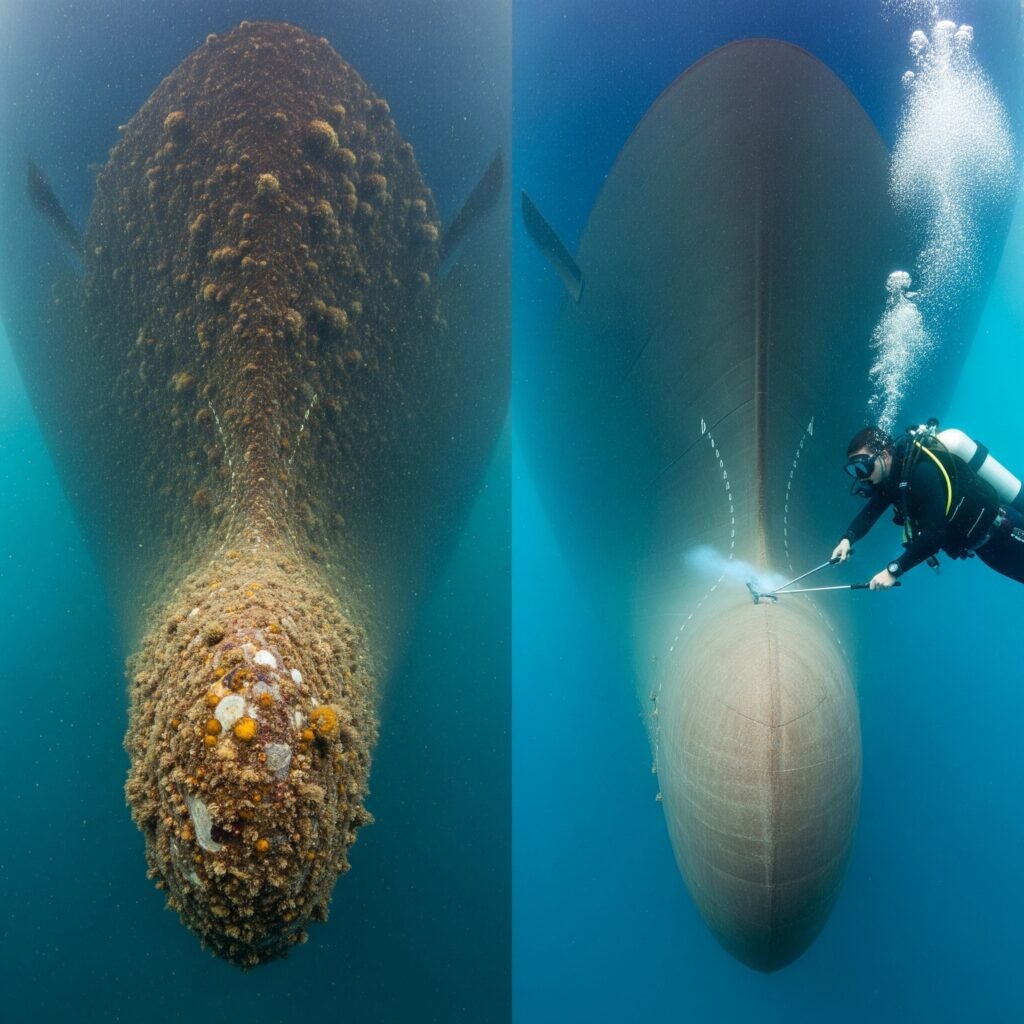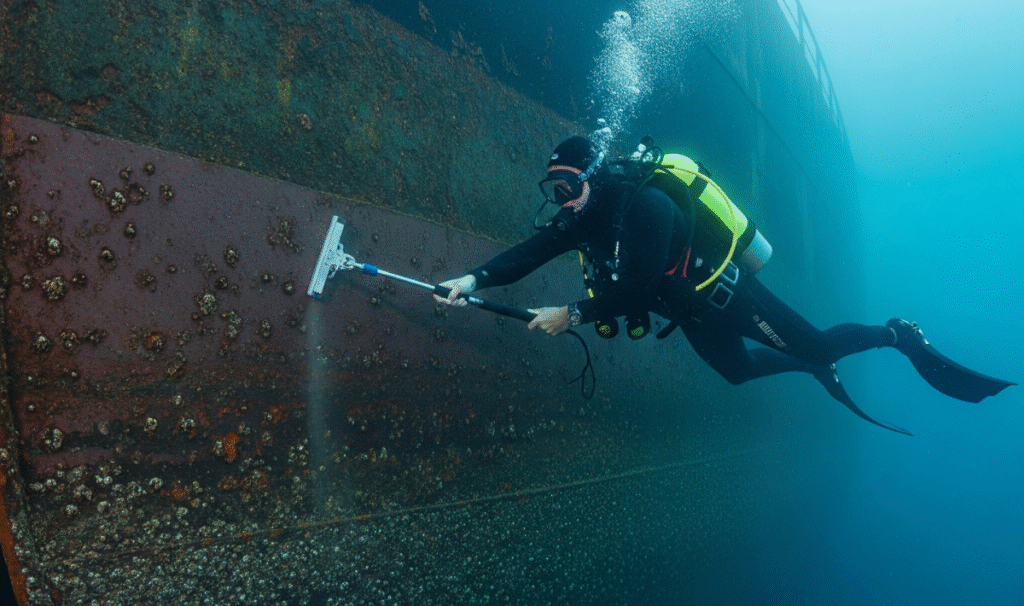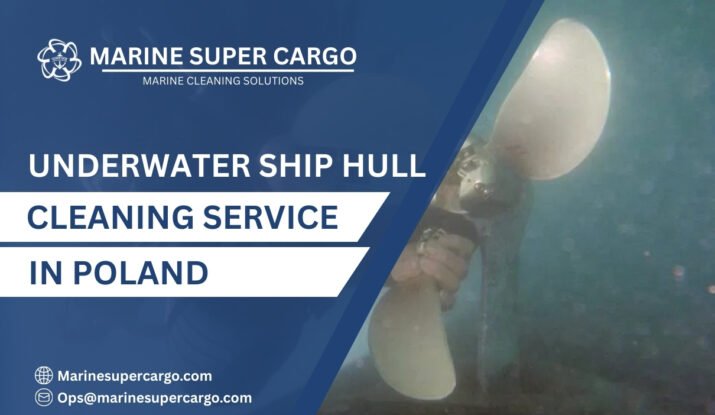Poland isn’t just known for its rich culture, amber jewelry, or historic cities—it’s also a key maritime hub in Central and Eastern Europe. With vital ports like Gdańsk, Gdynia, and Świnoujście along the Baltic Sea, Poland connects Europe to global shipping routes.
Every year, thousands of ships arrive carrying cargo, fuel, and raw materials. But beneath the waterline of these vessels, there’s a persistent enemy: biofouling. This growth of barnacles, algae, and marine organisms may seem small, yet it costs the shipping industry billions annually.
This is exactly where underwater ship hull cleaning in Poland comes into play. It’s not just maintenance—it’s a critical step that saves money, enhances safety, and protects the oceans.
What is Underwater Ship Hull Cleaning in Poland?
Imagine your ship’s hull like a well-polished airplane wing—built to glide smoothly. Now, cover it with sticky slime and barnacles. Suddenly, every mile becomes harder, and engines groan louder. That’s the reality of biofouling.
Underwater ship hull cleaning in Poland involves professional divers or robotic systems that carefully remove growth underwater using brushes, cavitation jets, and suction devices. Debris is collected responsibly to prevent releasing organisms back into the Baltic.
How Biofouling Increases Resistance
When organisms stick to a hull, water resistance spikes. Think of dragging a net behind you while swimming—it slows you down, forcing you to use more energy. For ships, that energy equates to fuel. Studies confirm biofouling can raise fuel use by 15–40%.

Fuel Savings and Optimized Performance
Through underwater ship hull cleaning in Poland, vessels regain their streamlined performance. The engines don’t need to overwork, resulting in significant fuel savings and reduced travel times. For ships operating routes across the Baltic and Northern Europe, these savings add up quickly, often outweighing the cost of cleaning itself.
Preventing Corrosion and Hull Damage
Biofouling is more than drag—it accelerates corrosion. Algae and mollusks trap moisture, weakening protective coatings and eating away at steel. Over time, this shortens a vessel’s operational life.
With underwater ship hull cleaning in Poland, these risks are minimized. Regular cleaning enhances coating effectiveness and slows down long-term hull deterioration, allowing ships to remain seaworthy for years longer.
Compliance with Maritime Regulations
The IMO sets strict global standards for maintenance. Ships docking in Poland are frequently inspected, and fouled hulls risk non-compliance with MARPOL regulations, delays, and fines. Consistent cleaning ensures ships remain compliant, avoiding costly downtime.
Lowering Greenhouse Gas Emissions
Smoother hulls mean reduced drag, which directly cuts down fuel consumption and emissions. According to imo.org, shipping accounts for about 3% of global CO₂ emissions. By maintaining efficiency through underwater ship hull cleaning in Poland, operators reduce their environmental footprint.
Preventing the Spread of Invasive Species
The MARPOL Convention highlights the biosecurity risks of species transfer. For the Baltic—home to delicate ecosystems—a single foreign species introduced could upset ecological balances. Hull cleaning helps ensure invasive species don’t hitch rides into Polish waters.
Strategic Baltic Sea Location
Located at the intersection of Central Europe and Scandinavia, Poland’s ports make it an ideal location for routine underwater ship hull cleaning in Poland. Ships often stop here naturally, making cleaning both cost- and time-efficient.
Skilled Divers and Growing Innovation
Poland has highly trained divers and marine professionals working with international best practices from imca-int.com. Combined with innovations in port infrastructure, Poland is positioned as a leader in sustainable hull cleaning services.
The Process of Underwater Hull Cleaning in Poland
Step-by-Step Cleaning Overview
- Inspection – Divers or ROVs inspect hull fouling and structural condition.
- Cleaning – Marine growth removed with brushes, scrapers, or cavitation tools.
- Surface Polishing – Restores hydrodynamic smoothness.
- Debris Capture – Collection systems ensure fouling isn’t discharged.
- Final Checks – Reports issued for compliance and maintenance logs.
Modern Tools and Technology Used
Underwater ship hull cleaning in Poland increasingly uses robotic ROVs (remotely operated vehicles) to improve efficiency, protect divers, and minimize coating wear. Eco-suction and debris collection systems safeguard the Baltic’s sensitive ecosystem.
Cold Baltic Conditions and Fouling
You might think colder waters prevent biofouling, but that’s not true. The Baltic, with its mix of fresh and saltwater, is prone to significant fouling during the summer months. This creates recurring challenges for operators in Poland’s ports.
Balancing Frequency with Costs
Hull cleaning too frequently risks damaging coatings; too infrequently, and fouling skyrockets, driving up fuel costs. Experts suggest scheduling underwater ship hull cleaning in Poland every 6–12 months, depending on ship activity and trade routes.

The Future of Hull Cleaning in Poland
Eco-Friendly Innovations
New antifouling paints without harmful biocides, as well as green brushing methods, are becoming available. Poland’s ports are embracing these technologies to maintain environmental stewardship in the Baltic.
AI and Robotic Cleaning Systems
Soon, AI-based sensors may predict hull fouling levels and trigger automated cleaning schedules. Robotic systems, already tested globally, are expected to make underwater ship hull cleaning in Poland faster, safer, and greener.
Conclusion
Hull cleaning may take place quietly beneath the waterline, but its advantages extend across safety, efficiency, and sustainability. The three key benefits of underwater ship hull cleaning in Poland are undeniable:
- Fuel efficiency and cost savings are achieved by minimizing drag and reducing fuel use.
- Improved vessel safety and extended lifespan through corrosion prevention and regulatory compliance.
- Environmental protection, with fewer emissions and fewer invasive species.
For shipowners, operators, and ports, regular hull cleaning is more than maintenance—it’s a smart, eco-friendly strategy. Partnering with experts like CleanShip.co ensures long-term success.
FAQ:
Q1. How often should ships schedule underwater hull cleaning in Poland?
Typically, every 6–12 months, though fouling rates vary with routes and port times.
Q2. Does cleaning damage protective hull coatings?
Not when performed with modern brushes and robotic systems designed to protect coatings.
Q3. Is underwater hull cleaning environmentally safe?
Yes—modern systems in Poland capture debris to prevent polluting Baltic waters.
Q4. Why is Poland a good location for hull cleaning?
Its Baltic ports are strategically located, with skilled divers and advanced facilities available.
Q5. Can hull cleaning reduce carbon emissions?
Absolutely. By lowering drag, underwater ship hull cleaning in Poland reduces fuel use and CO₂ emissions significantly.


